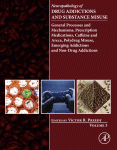Chapter 18 – Drug Addictions and Genetics of the Dopamine Pathway

Abstract
Drug addiction refers to a broad phenotype, encompassing behavioral, cognitive, and biological (including genetic) substrates. Twin studies have estimated the heritability of drug addiction between 30% and 60%. Dopamine has a major role in different facets of addiction, including the reinforcing effects of addictive drugs or their aversive effects. A broad literature has examined the role of genes involved in the dopaminergic pathway and their role in the development of addiction. This chapter is not an extensive review but rather a focus on the most relevant and more recent studies in the field. We reexamined the variant TaqIA/rs1800497 of the dopamine D2 receptor, DRD2 gene, and bring some insight into the role of other variants involved in the dopamine circuitry, including most recent studies on the catechol-O-methyltransferase COMT gene. We also examine the results of genome-wide association studies in drug addiction and give some cues on the expectations in the area.